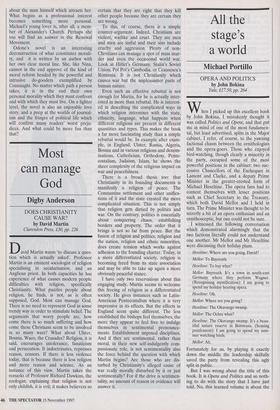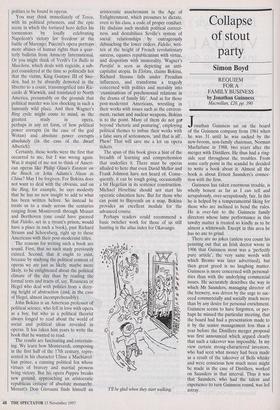All the stage's a world
Michael Portillo
OPERA AND POLITICS by John Bokina
Yale, L17.50, pp. 264
When I picked up this excellent book by John Bokina, I mistakenly thought it was called Politics and Opera; and that put me in mind of one of the most fundamen- tal, but least advertised, splits in the Major cabinet. I refer, of course, to the yawning factional chasm between the ornithologists and the opera-goers. Those who enjoyed bird-watching, though clearly a minority in the party, occupied some of the most powerful positions in the cabinet: two suc- cessive Chancellors of the Exchequer in Lamont and Clarke, and a deputy Prime Minister in the greater-crested form of Michael Heseltine. The opera fans had to content themselves with lesser positions such as Chief Secretary to the Treasury, which both David Mellor and I held in turn. The Prime Minister was thought to be secretly a bit of an opera enthusiast and an ornithosceptic, but one could not be sure.
I witnessed the following conversation which demonstrated alarmingly that the two factions literally could not understand one another. Mr Mellor and Mr Heseltine were discussing their holiday plans.
Heseltine: Where are you going, David? Mellor: To Bayreuth. Heseltine: To buy what?
Mellor: Bayreuth. It's a town in south-east Germany where they perform Wagner. (Recognising mystification): I am going to spend my holiday hearing opera.
Heseltine: Oh.
Mellor. Where are you going? Heseltine: The Okavango swamp. Mellor. The Ochre what?
Heseltine: The Okavango swamp. It's a beau- tiful nature reserve in Botswana. (Sensing puzzlement): I am going to spend my sum- mer watching birds.
Mellor: Ah.
Fortunately for us, by playing it exactly down the middle the leadership skilfully saved the party from revealing this ugly split in public.
But I was wrong about the title of this book. It is Opera and Politics and so noth- ing to do with the story that I have just told. No, this learned volume is about the politics to be found in operas.
You may think immediately of Tosca, with its political prisoners, and the epic scene in which the tortured hero defies his tormentors by loudly celebrating Napoleon's victory for freedom at the battle of Marengo. Puccini's opera portrays more abuses of human rights than a quar- terly bulletin from Amnesty International. Or you might think of Verdi's Un Ballo in Maschera, which deals with regicide, a sub- ject considered at the time so politically hot that the victim, King Gustave III of Swe- den, had to be absurdly demoted in the libretto to a count, transmogrified into Ric- cardo di Warwick, and translated to North America, presumably on the grounds that political murder was less shocking in such a famously wild place. And then Wagner's Ring cycle might come to mind, as the greatest study in opera, perhaps in any art form, of how political power corrupts (in the case of the god Wotan) and absolute power corrupts absolutely (in the case of the dwarf Alberich).
Certainly, those works were the first that occurred to me, but I was wrong again. Was it stupid of me not to think of Ameri- can operas like Philip Glass's Einstein on the Beach or John Adams's Nixon in China? May I be forgiven. For Bokina does not want to deal with the obvious, and on the Ring, for example, he says modestly that he has no new insight to add to what has been written before. So instead he treats us to a study across the centuries ranging from Monteverdi through Mozart and Beethoven (one could have guessed that Fidelio, set in a tyrant's prison, would have a place in such a book), past Richard Strauss and Schoenberg, right up to those Americans with their post-modernist titles.
The reasons for writing such a book are sound. First, that no such study previously existed. Second, that it ought to exist, because by studying the political content of operas we are just as likely, maybe more likely, to be enlightened about the political climate of the day than by reading the formal texts and tracts of, say, Rousseau or Hegel who deal with politics from a dizzy- ing height of abstraction (and, in the case of Hegel, almost incomprehensibly).
John Bokina is an American professor of political science, who fell in love with opera as a boy, but who as a political theorist always longed to read about the world of social and political ideas revealed in operas. It has taken him years to write the book that he wanted to read.
The results are fascinating and entertain- ing. We learn how Monteverdi, composing in the first half of the 17th century, repre- sented in his character Ulisse a Machiavel- lian prince, a cunning political fox whose virtues of bravery and martial prowess bring victory. But his opera Poppea breaks new ground, approaching an aristocratic republican critique of absolute monarchy. Mozart's Don Giovanni finds himself an aristocratic anachronism in the Age of Enlightenment, which presumes to dictate, even to his class, a code of proper conduct. He disdains such modish political correct- ness, and destabilises Seville's system of social relationships by outrageously debauching the lower orders. Fidelio, writ- ten at the height of French revolutionary success, equates republicanism with virtue, and despotism with immorality. Wagner's Parsifal is seen as depicting an anti- capitalist utopia. In Elektra, claims Bokina, Richard Strauss falls under Freudian influences, and transforms a tragedy concerned with politics and morality into `examinations of psychosexual relations in the drama of family life'. And as for those post-modernist Americans, wrestling in their works with issues such as the environ- ment, racism and nuclear weapons, Bokina is to the point. Many of them do not get, beyond 'rhetoric and posturing', employing political themes to imbue their works with a false aura of seriousness, 'and that is all'. Phew! That will save me a lot on opera tickets.
The span of this book gives a hint of the breadth of learning and comprehension that underlies it. There must be operas alluded to here that even David Mellor and Frank Johnson have not heard of. Conse- quently, it can be tough going, occasionally a bit Hegelian in its sentence construction. Michael Heseltine should not start his operatic education here. But for those who can point to Bayreuth on a map, Bokina provides an excellent module for the advanced course.
Perhaps readers could recommend a basic twitcher work for those of us still hunting in the atlas index for Okavango.
J'll be glad when they start walking.'











































































 Previous page
Previous page